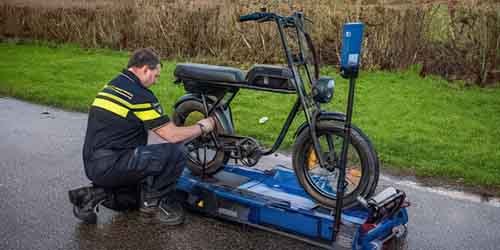The Dutch Caribbean Police Force (KPCN) has acquired new chassis dynamometer equipment as part of ongoing efforts to improve traffic safety and enforce regulations governing electric vehicles across Bonaire, Saba, and Sint Eustatius.

Background
In May 2024, the Bonaire Triangle—comprising Public Entity Bonaire, the Prosecutor’s Office, and KPCN—established comprehensive agreements addressing regulations, enforcement, and public information regarding fatbikes, e-bikes, and electric scooters. Following this agreement, KPCN announced that active monitoring of compliance would commence in the second half of the year.
New Equipment Deployment
KPCN has purchased three chassis dynamometer units, one for each island. The Bonaire unit has been delivered and is operational, while equipment for Saba and Sint Eustatius is expected to arrive shortly.
What is a Chassis Dynamometer?
A chassis dynamometer is a precision testing device that enables police to accurately measure the speed capabilities of mopeds, scooters, and electric bicycles, including fatbikes. By positioning a vehicle on the dynamometer, officers can reliably determine whether it complies with legal speed requirements. The device provides automatic notification when a vehicle exceeds permitted speed limits.
Legal Framework
Traffic regulations in the Dutch Caribbean are governed by the Traffic Ordinances of Bonaire, Saba, and Sint Eustatius, which establish permitted vehicle types, maximum speeds, and driver obligations.
Mopeds and Scooters
- Maximum speed: 55 km/h
- Age requirement: Minimum 16 years old
- Licensing: Moped permit required for ages 16-17; Class B driving license required from age 18
- Safety equipment: Helmet mandatory
- Documentation: Insurance and license plate required
Electric Bicycles with Pedal Assistance (E-bikes and Fatbikes)
- Pedal assistance limit: Must cease at 25 km/h
- Manual operation: Bicycles may exceed 25 km/h using pedaling power alone
- Reclassification criteria: Vehicles exceeding 30 km/h with assistance or equipped with throttles are legally classified as mopeds
- Moped classification requirements: License, helmet, registration, and insurance become mandatory
Electric Scooters and Non-Pedal-Assisted Motorized Vehicles
- Legal status: Automatically classified as mopeds
- Requirements: Must comply with all moped regulations
Enforcement Measures
KPCN employs graduated enforcement responses for non-compliant vehicles, ranging from warnings and fines to vehicle confiscation in severe cases. Officers routinely verify that drivers possess required documentation, including licenses, registration, insurance, and current tax payments.
Public Safety Initiative
The implementation of chassis dynamometer technology represents a significant advancement in KPCN’s commitment to improving traffic safety throughout the Dutch Caribbean region.
KPCN emphasizes that traffic safety is a collective responsibility and urges all road users to observe traffic regulations and demonstrate consideration for fellow travelers. Through responsible driving practices and regulatory compliance, both residents and visitors contribute to creating safer roadways across all three islands.
KPCN

 Saba News News and Information from Saba Island, Dutch Caribbean
Saba News News and Information from Saba Island, Dutch Caribbean
